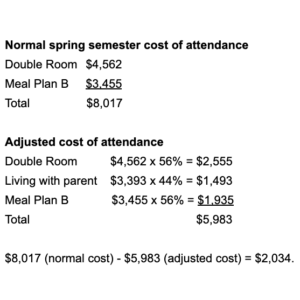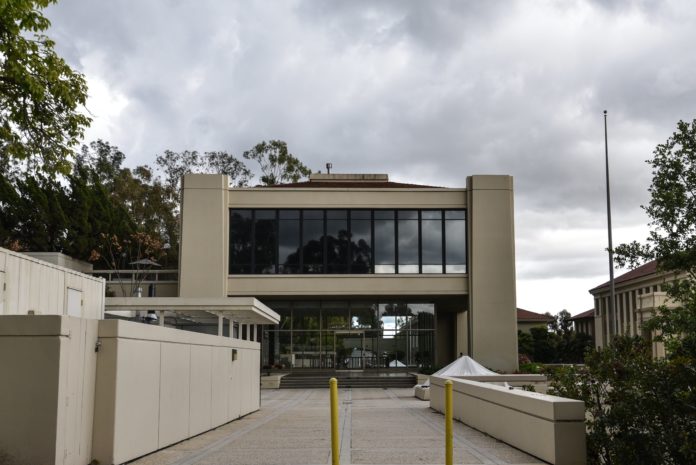Vice President and Chief Operating Officer Amos Himmelstein announced April 22 that Occidental adjusted its credit policy to increase financial support to students. The change followed concerns raised by students about the calculation of the initial April 3 room and board credit policy. Under the revised room and board credit policy, 95 percent of students on financial aid received additional credit. Occidental has spent approximately $3.5 million on room and board credits, according to Himmelstein.
The initial credit policy was made after Occidental transitioned to remote learning. Under this plan, Himmelstein said that students who vacated campus housing by the set deadline of March 20 would receive credit for 44 percent of their room charge for the Spring 2020 semester, equivalent to the percent of the semester remaining, plus their remaining meal plan balance.
The revised room and board credit policy takes into account the percentage of college costs that Occidental institutional grants covered. Under the initial credit policy, students who were paying more out-of-pocket costs or receiving fewer institutional grants got less credit than “might seem reasonable” according to the revised room and board credit page on the college’s website. After the secondary review, students received additional credit to their student accounts April 27. This additional credit totaled the difference between the revised calculation and the original amount they received April 3.
In his announcement of the revised room and board credit policy, Himmelstein said that Occidental is in the process of establishing a student emergency fund using money raised on the Day for Oxy April 20. The campaign raised $1,342,189 and is meant to support “the immediate needs of students, faculty and staff.” The student emergency fund will also use the $1,474,674 that Occidental expects to receive through the federal CARES Act, half of which is intended for emergency student aid. The latest guidance from the U.S. Department of Education said that CARES act funds cannot go to international students or anyone who is not a U.S. citizen. Currently, 138 international students from 30 countries attend Occidental.
The majority of Occidental’s financial aid is provided through need-based grants, and for many students, the $2,034 reduction came from their need-based grants, according to Director of Financial Aid Gina Becerril. If the difference between the reduction in financial aid and the credited 44 percent room charge with remaining meal plan balance was less than $750, Occidental added additional credit to ensure that the minimum net credit refund was $750. Becerril said via email that the business office set a $750 minimum to be fair to some students on need-based financial aid who, after financial aid adjustments, would receive a relatively small refund.
According to Davin Mckinley (senior), the math on these initial calculations was not transparent to the students receiving refunds. Mckinley inquired about her room and board credits after trying to understand how her financial aid adjustment and credits were calculated.
“As one of the of the students on the receiving end of [the financial aid adjustment], I would need a lot more communication and transparency from them to feel like they have my best interests in mind because as things stand, it feels like they’re trying to pull a fast one on a lot of their community who needs it right now,” Mckinley said.
Himmelstein said the decision to provide room and board credits was easy, but figuring out how to do it was complicated because of the multiple variables involved — different meal plans, room types and the number of students on financial aid.
“Our bottom line was that we wanted to err on the side of being fair and reasonable, while not losing sight of the overall impact on the College’s financial situation,” Himmelstein said via email.
Over 70 percent of Occidental students receive some form of financial aid. According to Becerril, because Occidental’s cost of attendance decreased after the transition to online learning, so did students’ need-based financial aid. Becerril said for students not on need-based financial aid, their credit depended on their individual room type and remaining meal plan balance.
Students on need-based financial aid, regardless of their actual meal plan and room type, receive aid based on a double room and Meal Plan B. After the March 20 move-out date, Becerril said that the financial aid office recalculated financial aid to account for the fact that Occidental’s room and board costs were 56 percent of the original full-semester cost. This resulted in a decrease of $2,034 in students’ financial aid packages.

According to Himmelstein, the initial room and board credits were posted to student accounts April 6. Based on the number of student inquiries about the room and board credits, the financial aid office sent an email April 10 to each student who had asked about the credits, stating that the financial aid office would conduct a secondary review of all accounts.
Honor Board juror Emily Zepeda (sophomore) said she wanted more transparency into the room and board credit process, as well as the work study payouts. She said that many of her friends were worried about their financial situations since moving back home.
“My main issue is literally seeing people’s anxiety and people so unsure of what they’re getting,” Zepeda said. “Then, for a lot of people once they did get that bill, they’re angry, they’re upset, very much so they felt kind of backstabbed in a way, like they were betrayed by a college who is supposed to have their back in the situation.”
Zepeda said because administrators had not provided enough clarity into the credit and work study calculations, the burden fell onto members of Associated Students of Occidental College (ASOC) to explain the calculations to individual students.
Former ASOC President Nina Srdić Hadži-Nešić (junior) and ASOC President Kitty Lu (junior), formerly Vice President of Financial Affairs, attended regular Budget and Strategic Advisory Committee (BSAC) meetings with Himmelstein, and Lu said they brought student concerns about room and board credits and work study to him. Lu said that they asked Himmelstein and his office to send out more clarification because students were coming to them with questions that they could not answer fully.
“I also didn’t want to explain more than what the college was saying because ultimately, it needs to come from the college,” Lu said. “As much as I explained, if the college isn’t backing me up, then I’m just saying things.”
Before Himmelstein announced the revised room and board credit policy April 22, Lu said she read over the email to ensure that students would not interpret it differently than they intended. According to Lu, the administration has become more responsive to students’ feedback about the credit policy and work study.
“They understand that students are all freaking out because they’re also kind of worried about what’s going to happen,” Lu said. “I think they’re doing a pretty good job of trying to understand and help respond to concerns.”
Occidental also gave each student who had to leave campus a $300 move-out credit, as well as additional work study and work award funds. The total credits added up to a total of over $4 million, according to Himmelstein. All of the additional support to work study and work award students in response to COVID-19 came directly from the college’s budget, Himmelstein said.
According to Himmelstein, Occidental had projected a budget surplus for this fiscal year in February, but as a result of COVID-19, the college will likely end up with a net deficit. He said via email that the college will have a better understanding of where they stand for the 2020–21 fiscal year once they have enrollment numbers for the incoming class of 2024, as well as the number of returning students for the next academic year.
![]()































